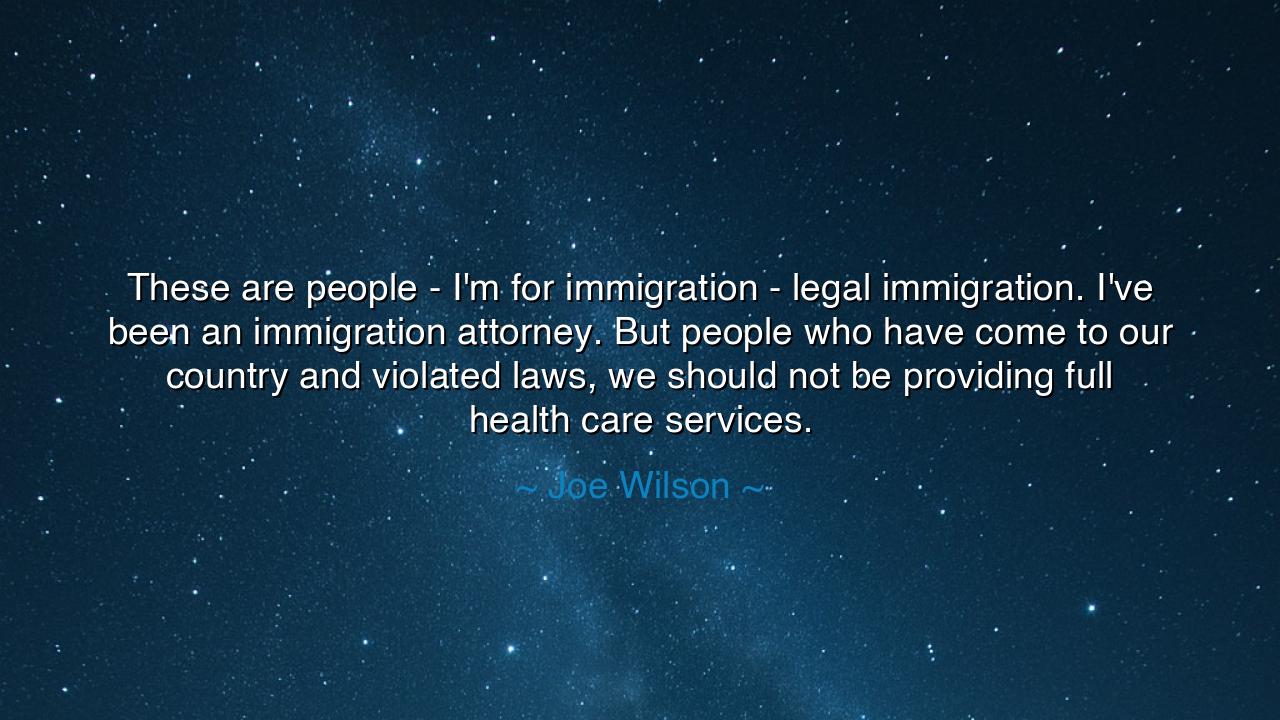
These are people - I'm for immigration - legal immigration. I've
These are people - I'm for immigration - legal immigration. I've been an immigration attorney. But people who have come to our country and violated laws, we should not be providing full health care services.






When Joe Wilson declared, “These are people — I'm for immigration — legal immigration. I've been an immigration attorney. But people who have come to our country and violated laws, we should not be providing full health care services,” he gave voice to a tension that lies at the heart of every nation that values both compassion and law. His words are not merely political; they are moral in nature, wrestling with the age-old question: how should a just society treat those who have entered its gates unlawfully? Within this question lives the eternal struggle between mercy and order, between the warmth of human empathy and the cold necessity of justice.
Wilson’s statement arises from the deep roots of the American debate over immigration — a debate older than the nation itself. From the earliest settlers who sought refuge and prosperity, to the modern tides of those who cross oceans and borders in search of safety or opportunity, America has long been both a haven and a fortress. Wilson, having once served as an immigration attorney, speaks not from ignorance, but from experience. He acknowledges the virtue of legal immigration, of those who seek to join a nation through its lawful doors. Yet he draws a boundary — that those who enter by breaking the law should not be granted the same public benefits as those who honored it. To him, this is not cruelty, but the preservation of justice, the sacred structure that sustains the republic.
To the ancients, this struggle would not be unfamiliar. In the laws of Solon, in the edicts of Rome, and even in the codes of Hammurabi, the principle stood that a society must protect both its citizens and its order. Yet alongside those laws were the teachings of prophets and philosophers who called for compassion — who reminded rulers that justice without mercy hardens into tyranny. The wise lawgiver, therefore, must walk between extremes: too much leniency, and the law loses its meaning; too much severity, and the nation loses its soul. Wilson’s quote stands upon that narrow ridge, where duty and empathy gaze uneasily at one another.
One may recall the story of the Roman general Aeneas, who fled the burning city of Troy and sought refuge across the seas. When he arrived on foreign shores, some welcomed him as a hero, others feared him as an intruder. The rulers who received him faced the same dilemma modern nations face: how to guard their borders without extinguishing their humanity. History judges them not only by the strength of their laws, but by the wisdom of their mercy. Wilson’s words echo this tension — a desire to protect the resources of his people while recognizing the dignity of those who yearn to belong.
In the modern world, health care stands as both symbol and substance of moral responsibility. To deny it feels harsh; to grant it without limit feels reckless. Wilson’s statement does not call for neglect of human life, but for the recognition that the social contract — the promise between government and governed — is built upon lawful participation. In his view, the nation’s compassion must rest on a foundation of order, lest it collapse under the weight of boundless obligation. He fears that generosity without boundaries can erode the rule of law, and that a government’s first duty is to those who have entered its covenant through lawful means.
Yet there is also a counterweight to this truth — a reminder from the ancients and the saints alike that justice must always serve humanity. To guard one’s nation is righteous, but to forget the suffering of others is a sin of indifference. Thus, the true wisdom lies not in rejection or acceptance alone, but in discernment — in the crafting of systems that are firm yet fair, lawful yet humane. The philosopher-king must learn to uphold the law while never losing sight of the living souls behind it.
The lesson of Joe Wilson’s words, then, is one of balance and principle. A nation must open its doors to the lawful, protect its people from the unlawful, and remember that the greatness of a civilization is not measured only by its borders, but by the integrity of its laws and the compassion of its people. Let future generations learn this harmony: to honor law without cruelty, and to extend mercy without folly. For only when justice and compassion walk together can a society remain both strong and righteous — a fortress of order, yet a beacon of hope to the world beyond its walls.






AAdministratorAdministrator
Welcome, honored guests. Please leave a comment, we will respond soon